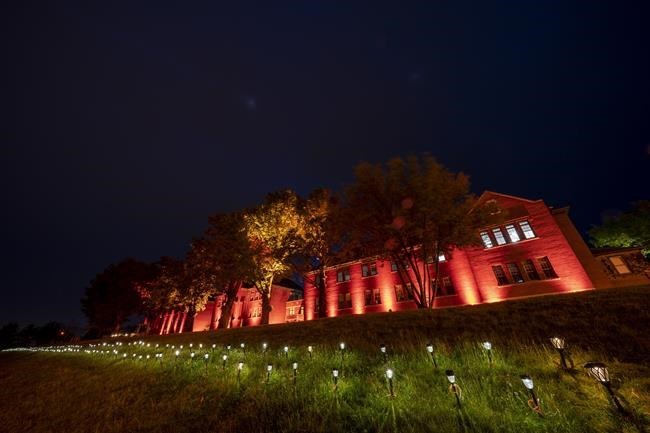MONTREAL — First Nations leaders and Quebec history teachers say the timing is right to reset the way Indigenous history is taught in primary and secondary schools across the province.
The recent discoveries of unmarked graves at former residential schools in British Columbia and Saskatchewan have further revealed the horrors of the colonial system, and teachers say those graves have forced them to re-evaluate the kind of history they are presenting to children.
Sarah Pashagumskum, chairperson of the Cree School Board, which oversees nine communities in the northern Quebec area of Eeyou Istchee, said the discoveries offer "a chance to give students a complete understanding of how Quebec became the province it is today."
"This is more than acknowledging that there are graves found at residential schools and acknowledging how sad that is," Pashagumskum said in a recent interview.
Last week, Cowessess First Nation, east of Regina, announced that ground-penetrating radar detected 751 unmarked graves at the former Marieval Indian Residential School. The news followed the discovery in May of what are believed to be the remains of 215 children at another former site in Kamloops, B.C.
Jonathan St-Pierre, a high school history teacher in Rouyn-Noranda, Que., about 630 kilometres northeast of Montreal, says Quebec tends to be cautious about depicting the province in a negative way.
"In the (history) program, it's only the federal government that is responsible for the residential schools," St-Pierre said in a recent interview. "We minimize and forget that Quebec was part of this, too. The government, the church, Quebecers also took part in this, but the information is missing."
Quebec's history curriculum, he adds, lets teachers decide how much importance to place on Indigenous history, which he says results in discrepancies in knowledge about First Nations peoples among Quebec students.
"Some students will hear more about Indigenous culture, residential schools, depending on the teacher's interest in the subject," St-Pierre said. "There is room for a lot of interpretation in the curriculum."
Michèle Audette, senior adviser on reconciliation and Indigenous education at Université Laval, says the problems in Quebec's history curriculum are reflected in the way Indigenous history is taught to her high school children.
"It's not the teacher's fault — she doesn't know the culture," Audette, a former commissioner with the National Inquiry into Missing and Murdered Indigenous Women and Girls, said in a recent interview. "But that means that we either live in longhouses or we are nomadic. We are so much more than that.
"My children go to school and they tell me they have to talk about spirituality and they want to have fun with it, but they have to stay within the restrained syllabus, otherwise they will lose points," said Audette, whose mother is Innu.
Quebec spent $1.6 million in 2018 to modify Indigenous content in history textbooks. Stereotypical images depicting Indigenous people were replaced, while biographies of Indigenous historical figures were added.
But the curriculum only mentions residential schools in passing. One brief passage states "compulsory attendance at residential schools designed to propagate Judeo-Christian culture and assimilate Indigenous peoples into the rest of the Canadian population helped accelerate the decline of certain Indigenous languages and weaken the social fabric in a number of communities."
"There’s been many redraft(s) and discussions in the past years in Quebec," Pashagumskum said, referring to the primary and high school history curriculums, "but these have resulted in fairly cosmetic change."
Quebec Indigenous Affairs Minister Ian Lafrenière said more reforms to the history courses are underway. "It is an important time to rebuild it and find what is missing and be reassured, in terms of the curriculum and training at school, it will be improved," he said in a recent interview.
"I would be a liar if I were to say everything is done. On the contrary, it's a long-term process."
But Lafreniere provided no detail about the changes or offered a timeline regarding when they would be implemented. The Education Department, meanwhile, didn't respond to repeated requests for comment.
Jonathan Cloutier, a history and geography high school teacher in Charlevoix, Que., north of Quebec City, says some of his students' initial knowledge about Indigenous history comes from their parents, which he said can be tinted with negative perceptions.
Cloutier says not only does the history program need a reset, but the entire school curriculum should be reviewed in collaboration with Indigenous leaders. "These are stories worth telling by the actors involved," Cloutier said in a recent interview. "It’s colonialism, to tell a story that is not our own. I feel like an impostor telling atrocities."
Indigenous voices, Pashagumskum said, need to be brought to the forefront of teaching history in the province in order to move past racist stereotypes and misconceptions.
"When we teach our history to our children with our own voices, and our own stories, we show that the colonial project has not succeeded and that we remain strong," Pashagumskum said. "It allows us to move our students toward a forward-looking and more empowered state, where they are fully informed about their past and how their present has been constructed."
This report by The Canadian Press was first published on June 29, 2021.
Virginie Ann, The Canadian Press

